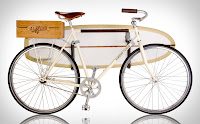 This is the provocative headline for an interview with Yvon Chouinard, founder of Patagonia. Although you will find this claim in the depths of the interview with Chouinard's view that the corporations have won, the majority of the interview is actually very positive. However, accepting this, Chouinard is trying to do something more radical -to change the corporation itself. He's doing this at Patagonia by changing:
This is the provocative headline for an interview with Yvon Chouinard, founder of Patagonia. Although you will find this claim in the depths of the interview with Chouinard's view that the corporations have won, the majority of the interview is actually very positive. However, accepting this, Chouinard is trying to do something more radical -to change the corporation itself. He's doing this at Patagonia by changing:- its supply chain - partly through the Sustainability Apparel Coalition (note - NO other surf company appears to be a member),
- its working conditions - when there's surf, people downtool and go shred, making the time up later,
- its response to economic downturn - bosses take a pay cut, and
- its corporate structure - the directors are protected from legal challenges if they put environmental or social issues above pure profit.
Coincidentally, BBC Radio 4 has an interesting 15 minute 'Four Thought' programme by Clare Melford, CEO of the International Business Leaders Forum about corporate sutainability based on Buddhist principles but coincidentally aiming for 'the triple bottom line' that Patagonia's model is also aiming at.
Unfortunately, the driving force of business seems to be to persuade people that they 'need' things that they only actually 'want'. The likes of Patagonia and the companies represented by Clare Melford are in the minority but seem to be the only hope that an increasing human population with aspirations of increasing consumption can continue to live on the one earth we have.






